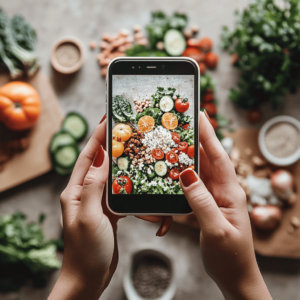Introduction
Social media influencers hold substantial sway over public perceptions in today’s digital landscape, particularly in health and nutrition. With vast followings and engaging content, they can shape opinions and drive trends. However, this influence has its pitfalls. Many influencers oversimplify intricate health concepts, reducing them to catchy slogans or quick tips lacking depth. This approach can lead to understanding essential topics like nutrition and disease prevention.
One area where this has profound implications is cancer awareness and management. Influencers may promote specific diets or supplements as miracle cures, disregarding the complexity of individual health needs and scientific evidence. As a result, their audience might be misled into thinking that following a specific diet alone can safeguard them against cancer, ignoring the multifaceted nature of health care that includes genetics, lifestyle choices, and medical advice. This blog post further explores these dynamics, highlighting the need for critical evaluation of information disseminated by influencers to make informed health decisions.
Generalization of Health Advice
A prevalent issue in health advice today is the tendency to generalize recommendations. Influencers frequently share one-size-fits-all guidance, ignoring the unique needs of individuals. One major factor that can vary widely is genetics. People have distinct metabolic rates and nutritional requirements based on their genetic makeup. Additionally, local food cultures significantly influence dietary habits and preferences. Food staples in one region may be less readily available or culturally accepted in another, impacting overall nutrition.

Geographical factors also contribute to these differences. For example, someone in a tropical climate may require more hydration and specific nutrients due to higher temperatures and humidity levels than someone in a temperate zone, where seasonal changes affect food availability. These complexities emphasize the importance of personalized health advice rather than blanket recommendations that might only suit some. Tailoring advice to individual circumstances ensures better outcomes for diverse populations.
Misrepresentation of Food and Nutrients
Another significant issue in contemporary nutrition discourse is misrepresenting specific foods and nutrients. Terms like superfoods are frequently used, creating buzz around items like chia seeds or trendy cooking methods such as air frying. Influencers and media outlets often promote these foods as universally beneficial, touting them as miracle solutions for health and wellness. However, the reality is far more nuanced. The actual health impact of these foods can vary drastically depending on an individual’s dietary needs, existing health conditions, and overall lifestyle choices.
What works wonders for one person might not have the same effects for another. For example, someone with a nut allergy might find a superfood blend that includes nuts harmful rather than helpful. Furthermore, promoting any single food as a cure-all undermines the importance of a balanced and varied diet. Instead of focusing solely on isolated ingredients, it’s crucial to consider the broader context of nutrition and how different foods interact within our diets.
Cancer and Diet: A Complex Relationship
One of the most troubling oversimplifications in health discourse is the connection between diet and cancer. Influencers often claim that specific foods or dietary patterns can prevent or even cure cancer. This assertion overlooks the intricate nature of cancer, a disease characterized by uncontrolled cell division. Cancer is not a singular condition; it encompasses over 100 types with unique characteristics and behaviours. Various factors, including genetics, environment, and lifestyle choices, contribute to an individual’s risk of developing cancer.
Reducing this complex relationship to simple cause-and-effect statements undermines the scientific understanding of the disease. While nutrition plays a role in overall health and may influence cancer risk, it is only one piece of a multifaceted puzzle. Ongoing research is essential to grasp how diet interacts with cancer development. Emphasizing moderation and variety in one’s diet is more beneficial than chasing trends based on anecdotal evidence. Ultimately, informed discussions about diet and health should reflect the complexity of these issues rather than superficial conclusions.
Cultural and Geographical Influences
Traditional diets, deeply rooted in cultural and geographical contexts, are frequently eclipsed by modern trendy diets showcased on social media platforms. These age-old dietary practices have evolved over generations, reflecting the nutritional needs of local communities based on their environment and available resources. Many traditional diets emphasize whole foods, seasonal ingredients, and cooking methods that enhance nutrient absorption. For instance, Mediterranean cuisine focuses on fruits, vegetables, whole grains, and healthy fats, promoting heart health and longevity. In contrast, trendy diets often prioritize short-term results with rigid rules that might not account for individual dietary needs or preferences.

Neglecting the wisdom embedded in these traditional eating patterns can lead to misinformation about nutrition. As people gravitate towards fads that promise quick fixes, they may overlook the balanced nourishment offered by time-honoured foods. This disregard could result in harmful dietary choices that undermine overall health. Appreciating and incorporating elements from traditional diets can provide a more holistic approach to nutrition. By blending cultural heritage with a modern understanding of health science, individuals can forge sustainable eating habits that nourish both body and spirit.
Misleading Health Claims
Influencers often promote misleading health claims regarding various cooking methods and dietary restrictions, such as caloric restriction or specific exercise regimens. These assertions are frequently not anchored in robust scientific research. For example, some influencers may extol the virtues of extreme caloric deficits, suggesting they are the best way to achieve rapid weight loss. However, such approaches must consider metabolic rates, pre-existing health conditions, and nutritional needs.
Additionally, trendy diet plans showcased on social media often need more comprehensive explanations of their long-term effects. When followers attempt these diets without professional guidance, they may encounter adverse health outcomes. The allure of quick fixes and dramatic transformations can lead individuals to adopt harmful practices unwittingly. Misinformation propagated without proper context can exacerbate or create new health issues. Ultimately, it’s crucial for consumers to critically evaluate these claims and seek advice from qualified health professionals before making significant dietary or lifestyle changes.
Conclusion
Social media influencers frequently share nutrition and health tips that are often oversimplified and generalized. This advice may appeal to a broad audience but can be misleading and harmful when applied indiscriminately. Individual differences, such as age, gender, genetics, and existing health conditions, play a significant role in determining what constitutes appropriate dietary recommendations. Additionally, cultural practices surrounding food can significantly influence nutritional needs and preferences. What works well for one person or community may not be suitable for another.
Moreover, many influencers need more scientific training to provide evidence-based guidance. This can lead their followers to adopt potentially dangerous practices without fully understanding the implications. For optimal health outcomes, consulting with healthcare professionals who can offer personalized dietary advice tailored to one’s specific circumstances is essential. Their expertise ensures that individuals make informed choices about their nutrition. In summary, while social media can inspire, critical thinking is necessary when evaluating health information shared online. Always prioritize professional guidance over generalized advice from non-experts.



